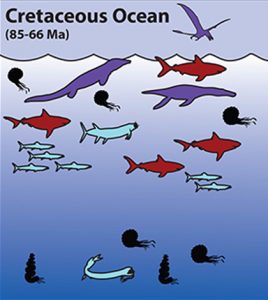Ocean Fish Faired Well In Past Climates, With Some Shifts
By reviewing 85 million years of fish fossil records, researchers at Scripps Institution of Oceanography have found that the basic structure of the ocean ecosystem was able to remain fairly stable for tens of millions of years despite large environmental changes of the past.
The ratio of fish compared to sharks, skates or rays stayed pretty much the same through long intervals, periods of millions of years, but there were several large shifts in the makeup of the ocean ecosystem through history.
One was a mass extinction event 66 million years ago believed to be responsible for the extinction of the dinosaurs. After that event, the abundance and diversity of ocean fishes exploded because many of their largest predators had gone extinct. The numbers of shark, however, didn’t significantly rise or fall.
Another shift, about 20 million years ago, saw the numbers of sharks go down, along with an increase in the variability of fish abundance. Researchers believe that competition with other marine organisms, like plankton or seabirds, influenced the balance of life.
A take-away from their work, researchers say, is that it takes a major event to upset the balance of the ocean ecosystem. In fossil records, there was evidence of intense warming similar to what Earth is experiencing at present and that had little effect on the long-term structure of the marine vertebrate community. But as for what effects today’s climate situation could have on ocean fish in the future, it’s hard to tell because the rate of present warming is higher than anything felt in the past.

One of the three main periods of distinct marine life composition in the oceans. (Credit: Scripps Institution of Oceanography)



0 comments